Couple of years ago, when I used to work as a teacher in an elitist private school in Islamabad, our principal announced that we would start a school garden to encourage environmental awareness. It sounded good, so I signed up, hoping to get involved in some hands-on gardening activities, while discussing environmental issues with my students.
Much to my disappointment, the school garden turned out to be a flower bed near the entrance, planted and managed by the support staff, without any involvement from the students, and with teachers participating through advice on what kind of plants would be best for the spot. Still, school garden made it to the educational bulletin and the school website, where the institution was lauded for its commitment to environmental values.
Greenwashing has to go
From the neoliberal point of view, it was a smart move: the school gained points in the category of aesthetics and ticked the box of environmental protection, while the kids didn’t even get their hands dirty. All in compliance to the key rule of the school: the customer is always right, and the customer being the parents, who paid a hefty fee every month. Rather than truly green education, it was —sadly — just an example of greenwashing in education.
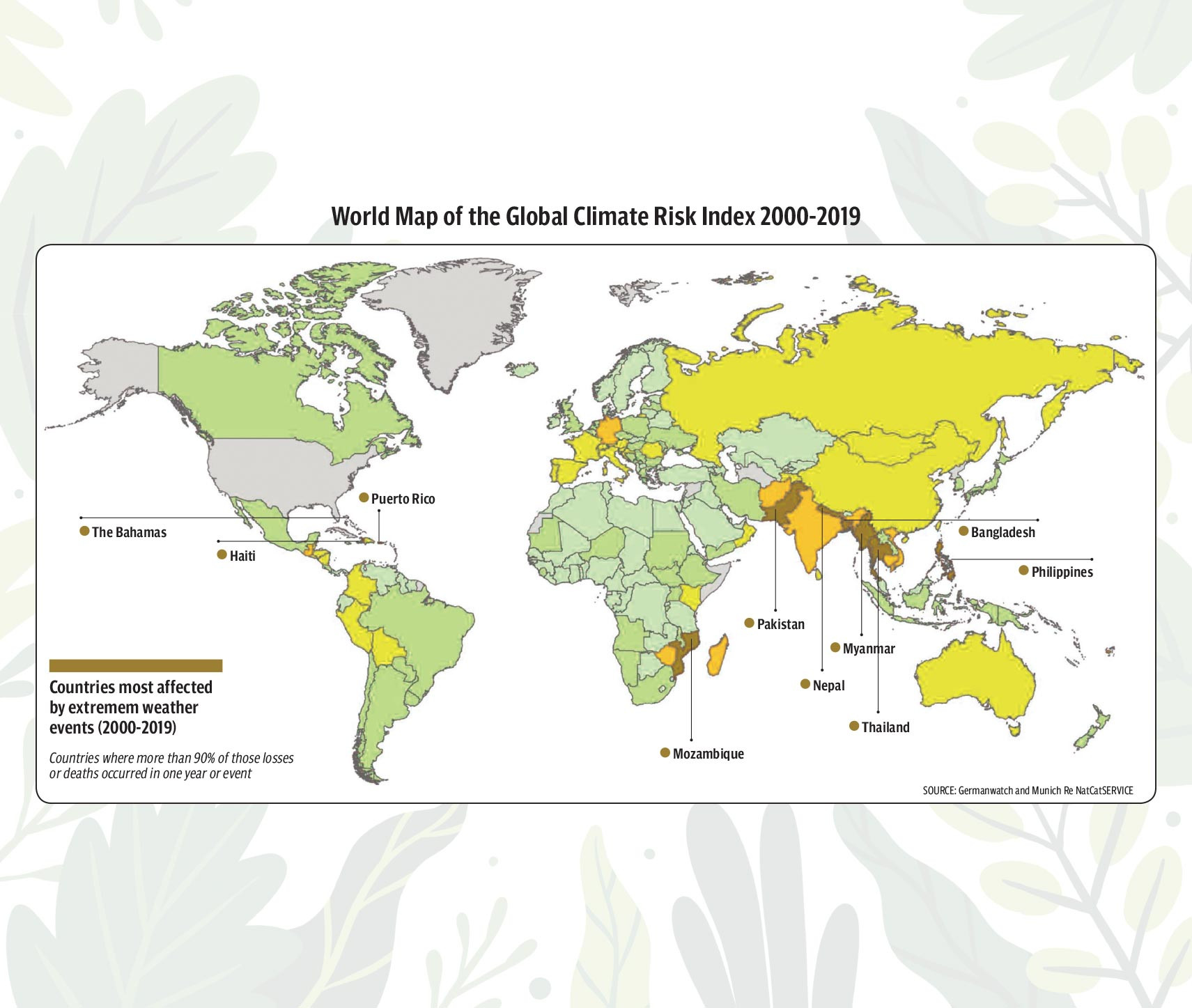
Climate action by education
Being one of the most vulnerable and the most affected countries on the planet, the country urgently needs green education. It could be called climate change and/or environmental education, sustainable development education, educational for environmental citizenship or critical global education.
That there are many labels and approaches is actually a good thing, as learning about the relationship between humans and their environment looks different in different settings. It also means that Pakistan will require its own version of green education: suited to the cultural, social and natural environment of the country.
With the power to transform societies and bring about change, education could be the strategic tool in global struggle against climate change, environmental crisis and social injustice. But it just has to be the right education.
The lack of knowledge about the causes, consequences, and solutions to climate change is one of the most easily identifiable barriers to climate action. Conversely, changes in educational programmes can trigger a social tipping process, as the new generation enters the job market and decision-making bodies. The recent #FridaysForFuture protests, where the school children's movement grew to 1.5 million students in 125 countries within half a year, is an example of such a shift.
Fast and furious
Yet, changing formal education is not easy, and usually involves a gradual evolution, that Pakistan cannot afford time-wise.
“We have been active in the field of environmental education for over forty years now,” says Syed Ayub Qutub, the director of Pakistan Institute for Environment Development Action Research. “Apart from directly reaching out to schools, in the last decade, we reached out to the Ministry of Climate Change, attempted to influence the Ministry of Federal Education, and through them the National Curriculum Council, and the people responsible for the curricula and textbooks, but we have had limited success so far. The Ministry of Climate Change have managed to get an environmental science programme for classes 9 and 10, but that is not sufficient.”
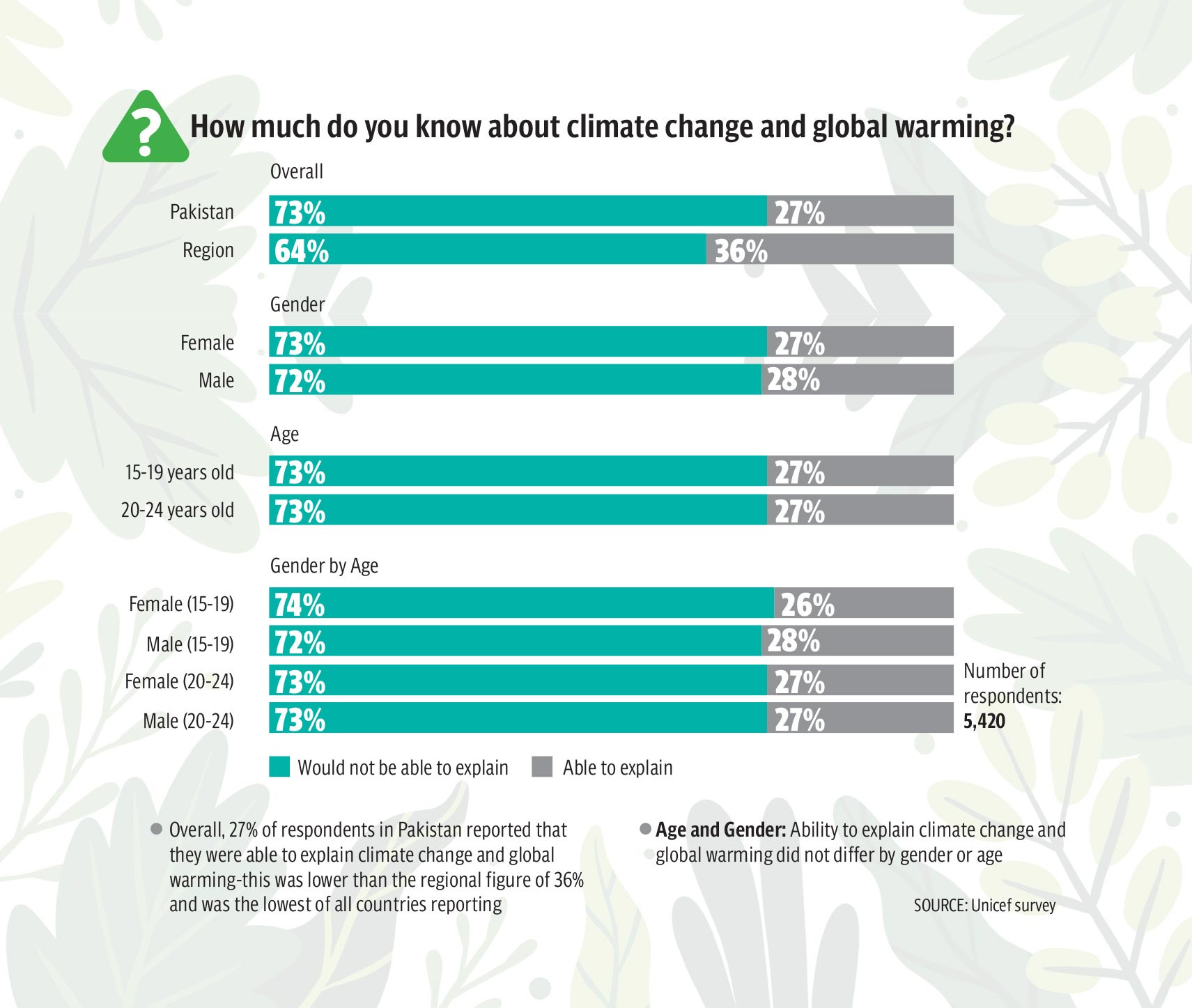
Working in silos does not work
A short survey through available material shows that some people and organisations are involved in different types of environmental education activities. Organisations such as recently established Collective Action for Climate Education, involving key development and humanitarian actors, call for the introduction of climate change education in Pakistani schools, but just how it will be implemented, the responsibility and who will take the lead remains unresolved.
There are also good quality materials available online, such as the Climate Change and Environmental Sustainability Module activity book and Environment and Climate Change Dictionary (in English and Urdu) from Agha Khan University, or South Punjab’s The Children's Green Book, available for free online. There are also NGOs and social enterprises offering environmental education in form of workshops available for schools and other institutions.
The problem is, all those different projects and activities are on small scale, only benefitting selected local groups for a limited amount of time. The environmental and climate change-oriented organisations are working in silos, and there is no countrywide coordination of green education activities.
“Real change is not possible if we operate in the same development agencies and academia bubbles,” says Dr Fozia Parveen, Assistant Professor at AKU’s Institute for Educational Development, and one of the leaders of the institution’s environment and climate initiative. Actively collaborating with other actors in the field, she trains and mobilises teachers to become climate education advocates.
“When it comes to platforms, no one knows what they’re doing,” adds Dr Parveen, as she is realistic about the impact of such collaborations. “Many are adding climate change just for the sake of it and unfortunately people who are in the field like to work independently, because they want to promote climate change education as their brand. With various platforms popping up, it seems that there are suddenly many interest groups, but they often only do it because it is a tick-box for some of their projects.”
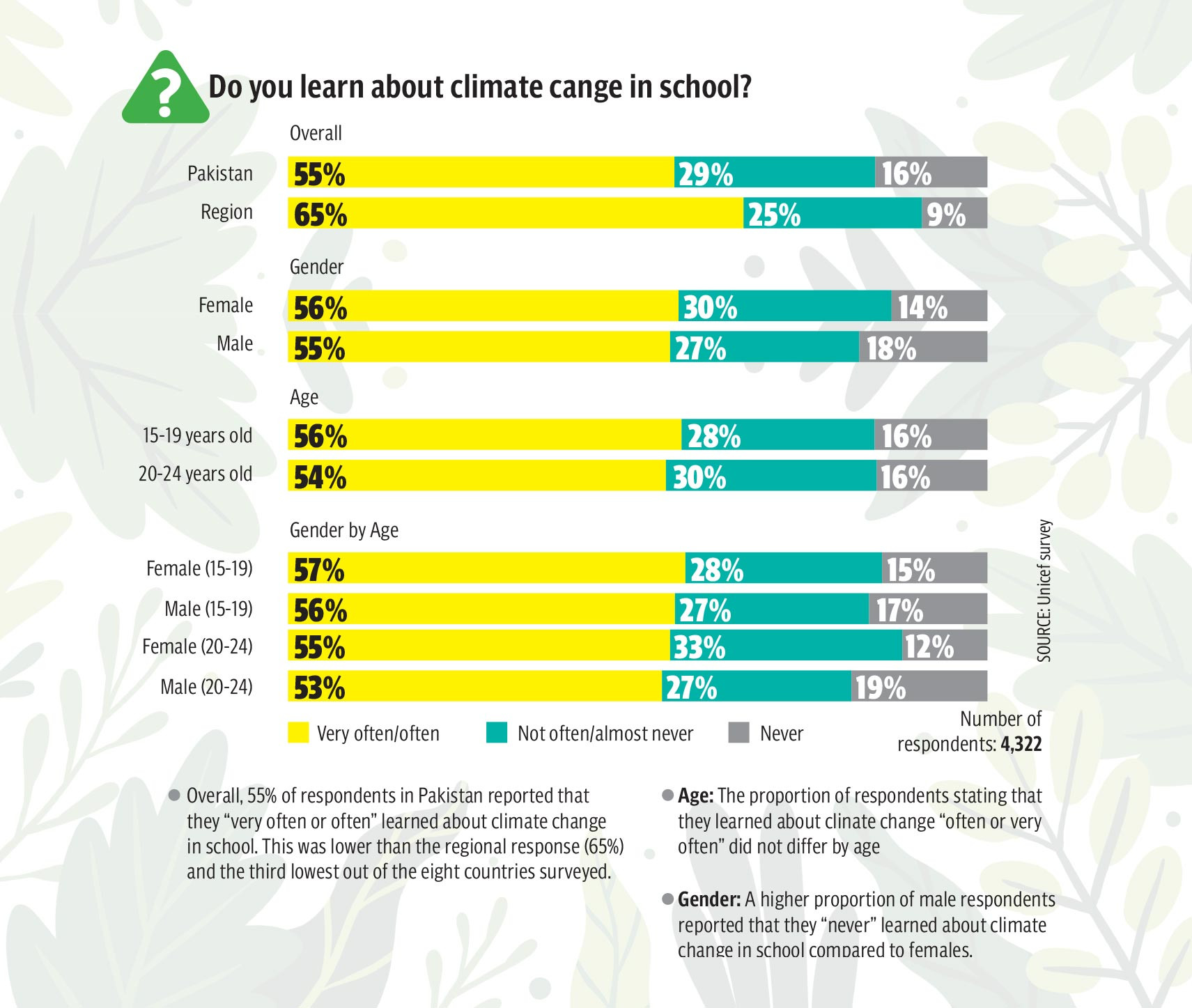
Case study: what Poland did
It doesn’t have to be that way though. There are countries where green/environmental/climate education is a domain of the Third Sector organisations, and they are quite successful at it. In Poland it is the NGOs collaborating in and represented by a single platform — Grupa Zagranica — that have been given the responsibility of delivering critical global and climate change education in Polish schools. They do it through dissemination of ready-made lesson plans and other materials, as well as through teachers training, rarely getting involved in teaching themselves (although it also takes place).
In the Polish model the government is earmarking a lump sum for global and climate education from the budget, and the NGOs are competing for it, but it is Grupa Zagranica that negotiates the amount, the mode of delivery and the content with the government. Surely, this model also has its weaknesses — the educational NGOs must be constantly engaged in project writing, for one thing — but it works, and it could be implemented quickly and fairly painlessly for schools.
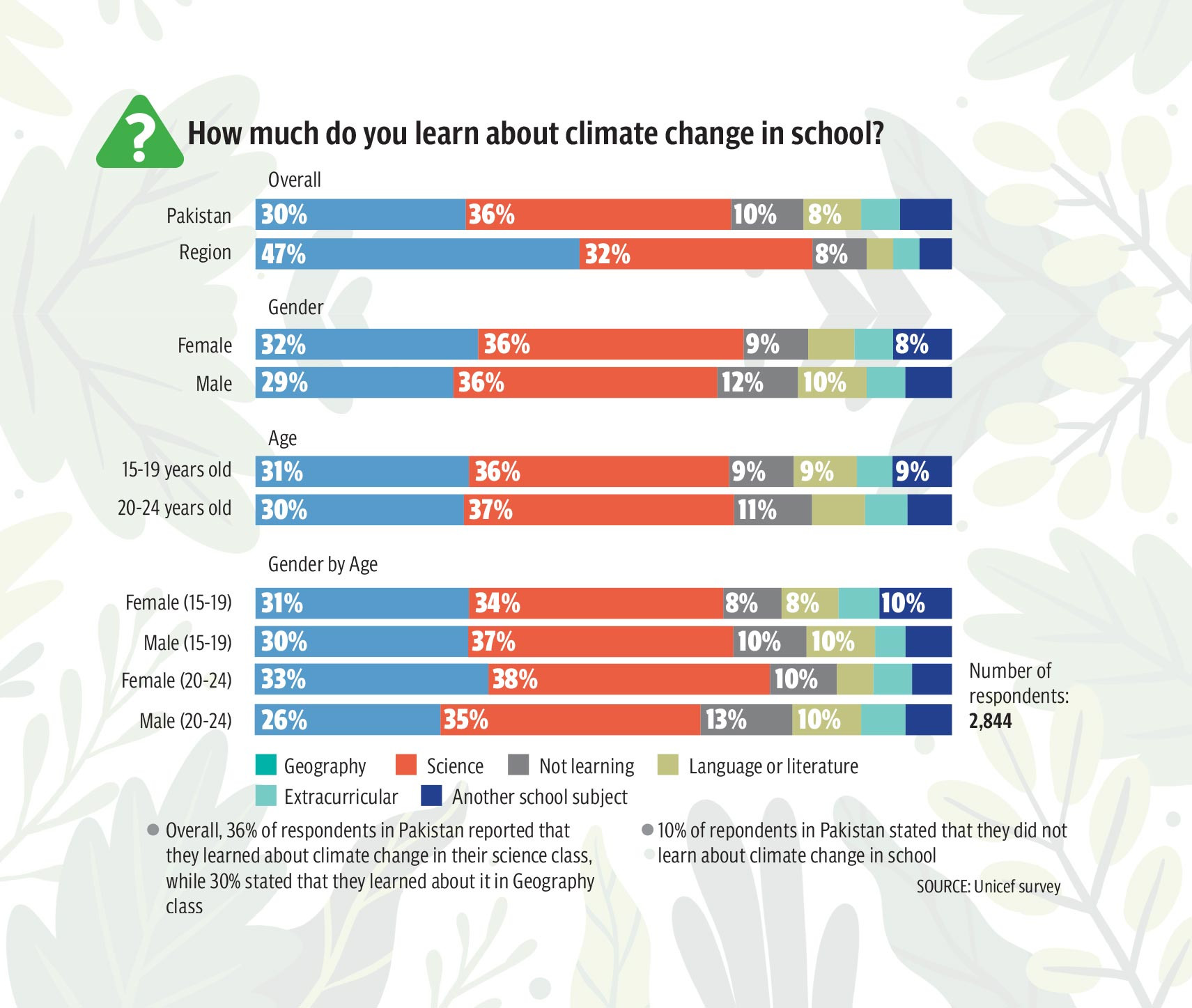
What Pakistan needs to do
In Pakistan, where much of education, especially non-formal, is managed by the Third Sector organisations, the model could be adopted quickly.
“If you want to make a countrywide change, you have to work with the Ministry of Climate Change, Ministry of Federal Education, provincial ministries, National Curriculum Council, and the provincial boards of education who are responsible for textbooks,” explains Mr Qutub. “We have been at it for over a decade, but it’s slow work. The specialists say that the teachers and students are already overburdened, so no scope for innovation.”
Dr Parveen insists that the government involvement is a must at all levels. “I know that the government is currently investing a lot of money in early childhood education, so why not add a component of climate education to it?” she points out. “And not as a session or a module, but as a transformative pedagogy. We can think how outdoor education could be used to enhance children’s learning about environment, and to create the next generation of leaders.”
But Dr Parveen’s optimism regarding government leadership is also on the wane. “Unfortunately, everyone in this country just talks.”
No one walks the talk
Government involvement in climate change education is insufficient, not only in Pakistan, but in the whole region. In an academic paper analysing policies and practices of climate change education in South Asia, published in 2022, Marcelus Mbah from University of Manchester, and fellow researchers, stated the following: “The current climate policies of South Asian countries may be a step in the right direction, but they are wholly inadequate in advancing an impactful Climate Change Education that supports climate change adaptation in the region.”
Some of the key issues they identified are the gap between the policies and practices, the policies on climate change adaptation which are not “implementation-ready,” the lack of accountability, low priority given to climate policies, and predominantly aid-driven approach.
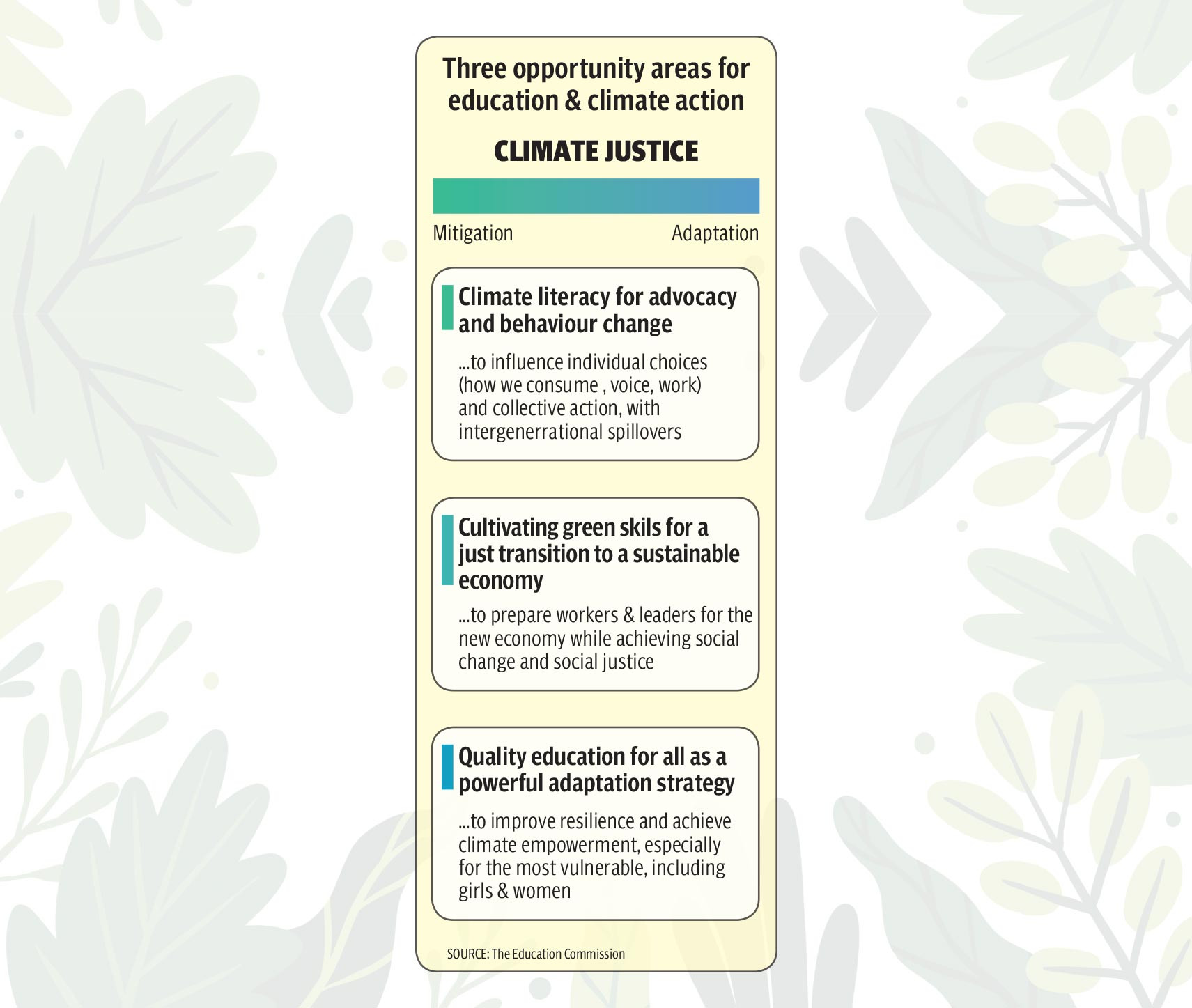
A case of class divide?
“Not a hardcore area for implementation by the government,” says Sarah Azmat, climate change officer at the Institute of Rural Management. She has hope in the civil society, and especially INGOs that could bring a global perspective and motivation for development.
Azmat believes that the biggest obstacle in mainstreaming environmental education is the gap between those who have the knowledge of climate change, and those who are already experiencing it. “If you talk to people who are well-educated, well-read and have the knowledge of climate change, they might recognise the gravity of situation,” she says. “But they have no real experience of it. While the local people, such as those affected by the floods, lack the understanding and knowledge of possible solutions.”
According to Ms Azmat, the implementation of climate education, especially using the materials produced by various NGOs, is more viable at private schools, who might have interest and resources, while public schools are more constrained in terms of finances and collaboration.
Is it the case, then, of a class divide? It is a well-established fact that climate change amplifies existing inequalities, disproportionately affecting the poorest communities, who are more exposed and more vulnerable to its impacts. But then, the climate change policies, including the climate education, should be designed to reduce those inequalities. The fact that the education system in Pakistan on the whole is malfunctioning, with huge disparities between educational facilities available to different communities and millions of children still out of school, is certainly not helping.
“Education must be reformed,” believes Mr Qutub, “Until we succeed in influencing the curriculum, and textbook writers to adopt active child-centred approach, there will be little positive demonstration of habits and values that are essential for responsible planet stewardship or even that of the local environment.”
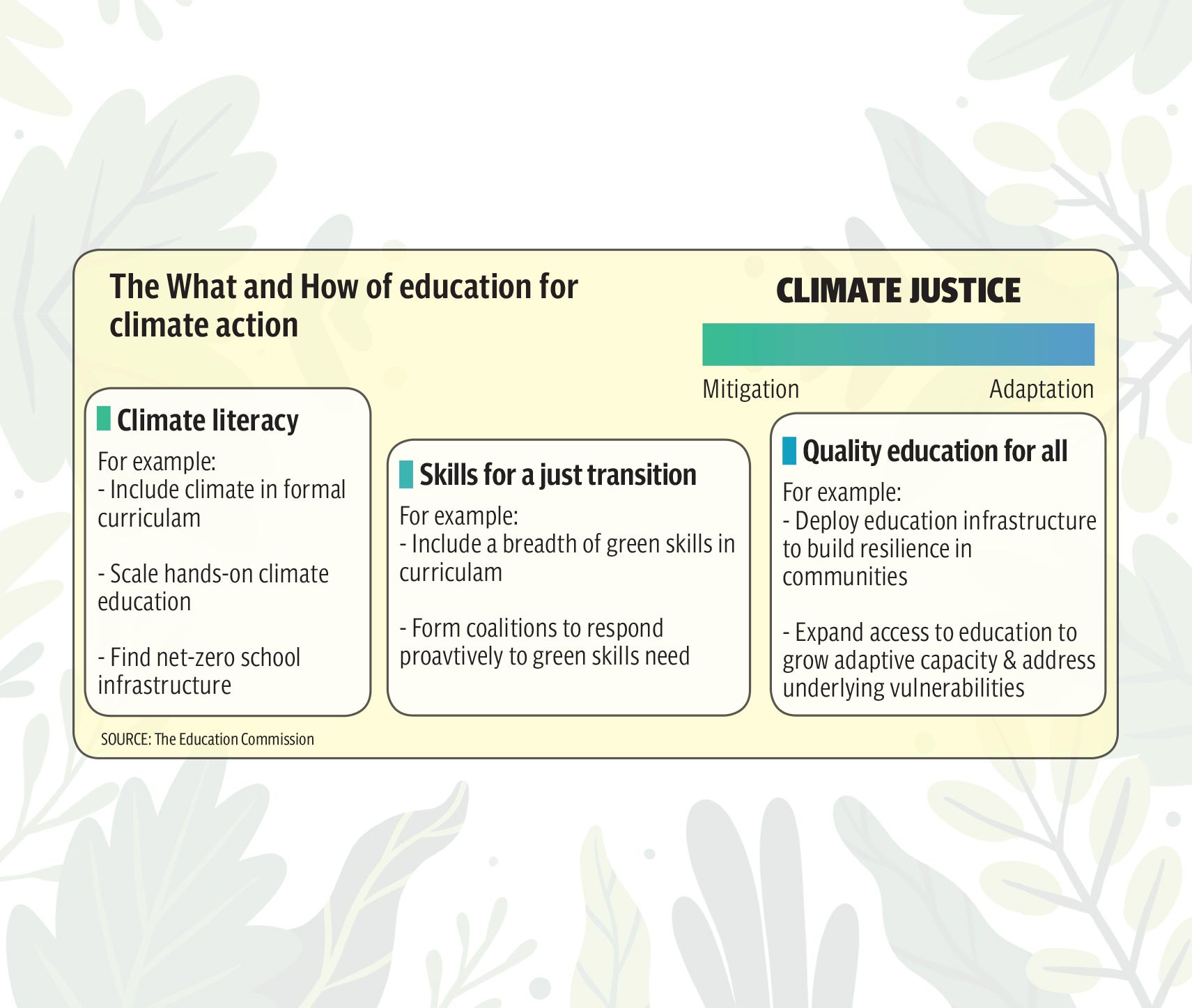
Go local
Localising might be just what is needed for environmental and climate education to take roots in Pakistan. Not copying foreign curricula, but creating our own, based on traditional approaches to environmental stewardship, that are still there in rural regions of the country. “Hailing from the North, I was involved in this kind of activity from a very young age,” recalls Dr Parveen. We have a community system, where the children learn from their elders, adopt a community-centred approach, and when they grow up, they become mentors to others.”
Her team of fellow researchers have explored the ways in which traditional methods of agriculture in Sindh and Balochistan may be harnessed to mitigate climate change, but, she feels that the research in this field in Pakistan is still limited.
Global development
Meanwhile, all around the world, researchers, development actors and activists are searching for Traditional Ecological Knowledge (TEK) and incorporating it in climate action. Dr Fikret Berkes, the key authority in the field, defines TEK as “a cumulative body of knowledge, practice, and belief, evolving by adaptive processes and handed down through generations by cultural transmission, about the relationship of living beings (including humans) with one another and with their environment.” In other words: traditional sustainable ways of living in and with the natural environment that surrounds and sustains us.
Building environmental and climate change knowledge around TEK could involve co-creating it with communities, inviting elders to share their wisdom and rediscovering local customs related to environment management. It would be a radical and democratising move that could truly transform the education system in Pakistan. A true green education, rather than just greenwashed one. It is easy to imagine it on a small, local scale, but what about the whole country?
Klaudia Khan is a freelance contributor
All facts and information are the sole responsibility of the writer
